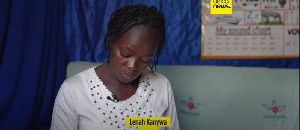Academic experts who took part in the final e-seminar series organised by the University of Cape Coast Business School say the coronavirus pandemic should awaken the senses of countries to focus on developing their domestic economies by encouraging local production as the new way to go.
Speaking on the theme: ‘Coronavirus Pandemic: Global Marketing, Logistics and Supply Chain’, Professor of International Business and Deputy Vice Chancellor for International Affairs & Diversity at the University of Applied Sciences, Bonn, Germany, Prof. Dr. Jurgen Bode, explained that COVID-19 has led to deglobalisation in which many countries are focusing on their strategies within as businesses are diversifying and innovating with 100 percent raw materials and inputs from within their respective countries.
He further stated that though the coronavirus pandemic has disrupted global marketing, logistics and supply chain, it has led to massive reduction in air pollution from the aviation and automobile industries. This has prompted government action in some cases, as Germany for example, has come out with stimulus packages targeted to promote the production of electric vehicles in order to reduce air pollution and meet climate change expectations.
Another member of academia, Prof. Daniel Agyapong, Head of Department of Marketing and Supply Chain Management at the University of Cape Coast, advised companies to identify and explore their local markets for their raw materials. He asked young businesses to revise their business models and form strategic alliances, adding that, startups, especially, must use mass advertisement like social media as it is cheap and effective to reach a lot of potential customers.
Prof. Bode further said that COVID-19 has taught the whole world that, countries multinational companies and other businesses can cut down on travel cost and still be productive and relevant, thereby, saving a lot of expenditure budgeted for business, conference and other related travels.
A Professor of Marketing and Associate Dean of Lindner College of Business, University of Cincinnati, USA, Prof. Susan Powell Mantel, said that despite global marketing disrupting severely for some companies, it has also created opportunities for other businesses through adaptation, innovation and diversification. She called on corporate bodies to be bold to review their business portfolio and strategies and ensure a good balance between risk and returns during this period.
She further advised businesses, especially, small and medium scale enterprises (SMEs) to engage in constant communication with their customers and clients. Sharing the American experience, she said, America has huge domestic marketing, logistics and supply chain intensity and generates diversity of internally sourced raw materials and suppliers. This, she said, minimizes the level of disruptions.
Another discussant, Mrs. Nuzurat Aba Sam, urged companies to create a diversified portfolio of suppliers and ensure that their suppliers are found within their countries, the sub region and globally. She explained that companies with only foreign suppliers were hard hit or suffered more than companies with alternative suppliers within their countries. Mrs. Sam explained that, as a country, there is a need to rethink an environment that can incentivise different types of suppliers of raw materials as a good lesson learned. She said when it comes to logistics, procurement and supply chain, not everything can be done through online because there must be a time for actual delivery and production.
Then, Mr. Kwabena Agyekum, Executive Director of Chartered Institute of Marketing Ghana explained that COVID-19 has taught marketers to engage in constant communication and give continuous assurances to their customers about their risks, products and services as well as their innovations. He said as marketers, lessons learnt could still be relevant for future marketing strategies.
In conclusion, the Dean of the School of Business, Prof. John Gatsi, appealed to institutions and employers not to deny their workers leave for the sandwich programmes merely because they are delivered online. He also appealed to businesses to create innovative engagement with students by creating virtual internship opportunities for those interested to have their internship experience with them. He further used the opportunity to thank all discussants who have contributed to making the six e-seminar sessions a success.
Business News of Tuesday, 7 July 2020
Source: thebftonline.com













